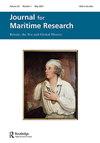The Admiralty’s interwar planning with the British fishing industry, 1925–1940
Q3 Arts and Humanities
引用次数: 0
Abstract
ABSTRACT The Admiralty and the Royal Navy made extensive use of the British fishing fleet in a variety of auxiliary roles during the First World War. On demobilisation the emphasis quickly switched to increasing the economic output of the British fishing industry and many of the wartime lessons were lost during the following decade. Throughout the interwar period the Admiralty struggled to frame a requirement for the contribution of the fishing fleet in during any future conflict. The contrary interests of minesweeping, anti-submarine warfare and fisheries protection were not reconciled with the result that the overall requirement was never fully visible. As the Second World War approached the Admiralty’s planning was further hampered by a loss of corporate understanding of the fishing fleet’s capabilities, a lack of technical intelligence (in the case of minesweeping) and by the effect of the British fishing crisis. This paper examines the Admiralty’s attempts to establish a coherent policy for the employment of the fishing fleet in an auxiliary role during the interwar period and its results on the outbreak of the Second World War.海军部在两次世界大战之间对英国捕鱼业的规划,1925-1940
在第一次世界大战期间,海军部和皇家海军广泛使用英国渔船队担任各种辅助角色。在复员过程中,重点迅速转向增加英国渔业的经济产出,许多战时的经验教训在接下来的十年中被遗忘了。在两次世界大战之间,海军部一直在努力制定一个要求,要求渔船队在未来的冲突中做出贡献。扫雷、反潜战和渔业保护的相互矛盾的利益不能与总需求从未完全可见的结果相协调。随着第二次世界大战的临近,海军部的计划进一步受到了企业对渔船队能力缺乏了解、缺乏技术情报(在扫雷的情况下)和英国渔业危机的影响的阻碍。本文考察了海军部在两次世界大战期间为渔船队的辅助作用建立连贯政策的尝试及其对第二次世界大战爆发的影响。
本文章由计算机程序翻译,如有差异,请以英文原文为准。
求助全文
约1分钟内获得全文
求助全文
来源期刊

Journal for Maritime Research
Arts and Humanities-History
自引率
0.00%
发文量
0
期刊介绍:
The Journal for Maritime Research ( JMR ), established by the National Maritime Museum in 1999, focuses on historical enquiry at the intersections of maritime, British and global history. It champions a wide spectrum of innovative research on the maritime past. While the Journal has a particular focus on the British experience, it positions this within broad oceanic and international contexts, encouraging comparative perspectives and interdisciplinary approaches. The journal publishes research essays and reviews around 15-20 new books each year across a broad spectrum of maritime history. All research articles published in this journal undergo rigorous peer review, involving initial editor screening and independent assessment, normally by two anonymous referees.
 求助内容:
求助内容: 应助结果提醒方式:
应助结果提醒方式:


